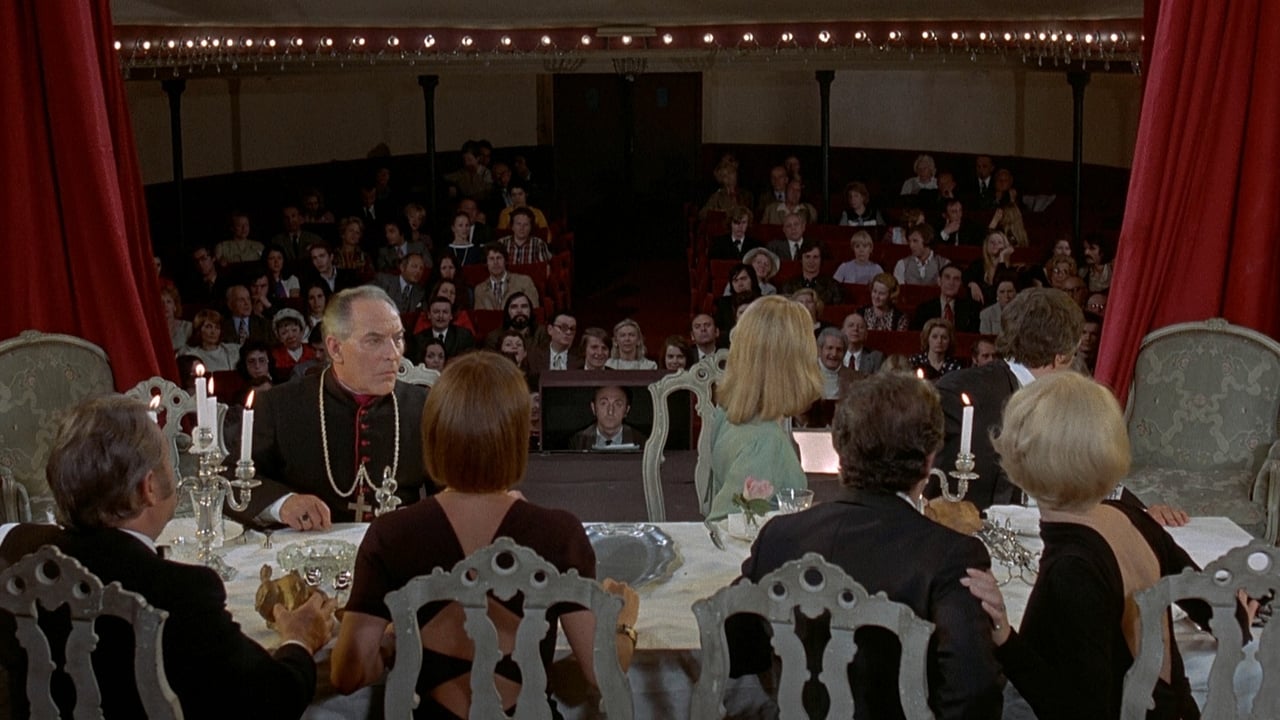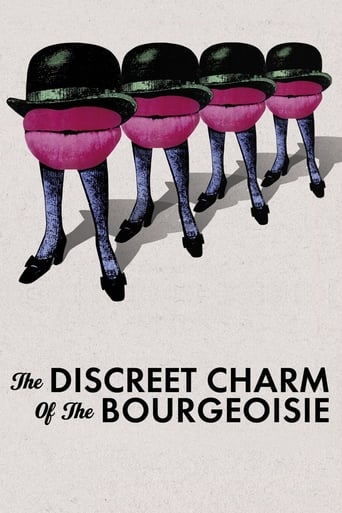Dorathen
Better Late Then Never
Orla Zuniga
It is interesting even when nothing much happens, which is for most of its 3-hour running time. Read full review
Roy Hart
If you're interested in the topic at hand, you should just watch it and judge yourself because the reviews have gone very biased by people that didn't even watch it and just hate (or love) the creator. I liked it, it was well written, narrated, and directed and it was about a topic that interests me.
Ezmae Chang
This is a small, humorous movie in some ways, but it has a huge heart. What a nice experience.
Armand
or just cruel. but this is not a real surprise ! because it is a Bunuel portrait of a fake world and manner for survive. about desires, search, rules all in a dark satire in which dreams and fears, games and food are mixed. a picture. interesting for the art of a great cast. nice for meeting with a remarkable director themes. charming for the strange humor. a film about need to escape from yourself. about a way without end. and, sure, about masks. nothing else. only fog of a social group and a game with surrealistic nuances. it is good occasion to understand not only art of Bunuel but spirit of a time. and to understand the essence of society of each period.
billcr12
Another entry from Luis Bunuel, Discreet Charm is an overlapping story of a group of rich people trying to get together for dinner. The first attempt is made at a house where the owners explain that the party was scheduled for the next night, and so they travel to a restaurant, and are told by the staff that the manager has died, and they are waiting for the coroner, while they hold a vigil over the corpse; not to worry it gets stranger, as two days later one of the couples takes off to have sex in a garden. Next up, some of the women check out a tea house which has run out of all beverages, except for water. A bishop shows up wearing gardeners clothes and is thrown out. When he returns in his vestments, they kiss his ass, revealing their hypocrisy. The good man of the cloth tells his flock that his parents were poisoned, and the murderer never caught. He later visits a dying man, administering the Last Rites. Before shuffling off this mortal coil, the near dead guy reveals a terrible secret to the bishop, which leads to a shocking conclusion, unlike anything you have ever seen. Bunuel was a visionary filmmaker.
petersj-2
I am aware many think its a classic but the film is pretentious and actually quite stupid. The symbolism is heavy handed. I know that many think this is a masterpiece but its a confusing mess. There are some parts that are forgotten and never explained. A woman comes on denying Christ but we never find out why. The sets look beautiful and to be fair there is a certain glamor to the film. The cast do what they can and the fault is not with he actors but with the director who seems to have an over blown ego. This was made at a time when some directors were trying to be very arty, esoteric and too clever by half. Today its a shambles. Some of the interior locations look fine but the dream sequences are just ridiculous. This sadly is almost embarrassing to watch today.
oyason
Six upper middle class jerks attempt to meet for dinner on a number of occasions and find themselves caught up in many a farce. In "The Discrete Charm of the Bourgeoisie", the everyday becomes entangled with dream at every turn. The reality of the drug running foreign ambassador comes into direct conflict with the guerrilla forces his domestic policies engender, the gardener monseigneur of the church ends up taking confession from his parents' murderer while the culprit is on his deathbed, the cocktail party hosted by a general breaks down into a small battle in his dining room, a sexually frustrated couple are forced to elude their company and couple out in the garden, an afternoon luncheon is turned into an audit of fratricidal confession from a young army lieutenant. At every crossroads, the pretentious "civility" of professional society finds itself disrupted by the casual violence and mayhem that underscores their class privilege. Bunuel's use of the nightmare tells the audience what the bourgeoisie knows very well: they know what a bunch of casual gangsters they actually are, and sleep will not let them hide from themselves. And none of the charm of the bourgeoisie will be enough to break them away from their ongoing isolation from themselves and nature, expressed very cleanly by Bunuel's repeated image of the six professionals, in semi-formal dress, walking down a country road in the middle of nowhere. And it's all very funny, in an unfunny sort of way.Bunuel's masterpiece holds up well, almost forty years after its release. Here's a farce that demonstrates just how far a "satirist" like Sasha Baron Cohen ("Borat") really has to go before he has anything substantial to say with farce or film.

